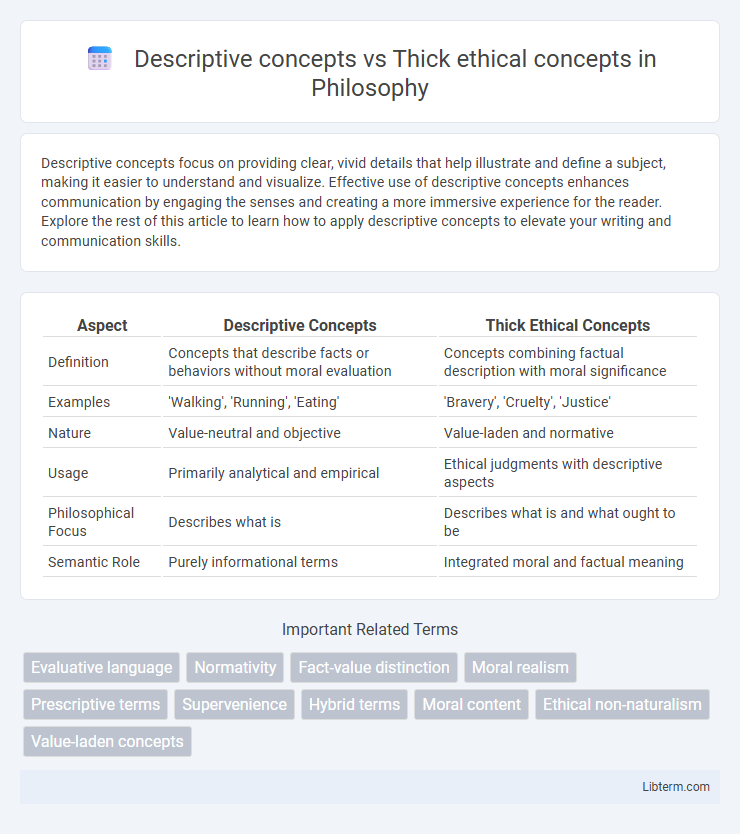Descriptive concepts focus on providing clear, vivid details that help illustrate and define a subject, making it easier to understand and visualize. Effective use of descriptive concepts enhances communication by engaging the senses and creating a more immersive experience for the reader. Explore the rest of this article to learn how to apply descriptive concepts to elevate your writing and communication skills.
Table of Comparison
| Aspect | Descriptive Concepts | Thick Ethical Concepts |
|---|---|---|
| Definition | Concepts that describe facts or behaviors without moral evaluation | Concepts combining factual description with moral significance |
| Examples | 'Walking', 'Running', 'Eating' | 'Bravery', 'Cruelty', 'Justice' |
| Nature | Value-neutral and objective | Value-laden and normative |
| Usage | Primarily analytical and empirical | Ethical judgments with descriptive aspects |
| Philosophical Focus | Describes what is | Describes what is and what ought to be |
| Semantic Role | Purely informational terms | Integrated moral and factual meaning |
Introduction to Ethical Concepts
Descriptive concepts in ethics refer to terms that objectively describe actions or behaviors without moral judgment, such as "lying" or "helping." Thick ethical concepts combine descriptive and evaluative elements, offering both factual content and a moral assessment, exemplified by terms like "cruel" or "courageous." Understanding the distinction between these concepts is fundamental in ethical theory as it clarifies how language conveys both factual information and normative evaluations.
Defining Descriptive Concepts
Descriptive concepts provide objective, value-neutral definitions based on observable characteristics and facts, serving to categorize phenomena without moral judgment. They function as foundational tools in analysis and communication by offering clear, consistent meaning detached from ethical implications. Unlike thick ethical concepts, which integrate evaluative content, descriptive concepts isolate purely factual elements to maintain clarity and precision in understanding.
Understanding Thick Ethical Concepts
Thick ethical concepts combine descriptive content with evaluative meaning, providing rich insights into moral understanding that go beyond mere facts. They express nuanced judgments, such as "cruel" or "courageous," embedding both a description of behavior and an ethical evaluation. Understanding thick ethical concepts is crucial for grasping complex moral experiences because they integrate factual observations with normative significance in everyday language.
Key Differences between Descriptive and Thick Concepts
Descriptive concepts provide objective, value-neutral descriptions of objects, events, or states of affairs, focusing on factual attributes without moral judgment. Thick ethical concepts combine descriptive content with evaluative, moral significance, embedding normative assessments within the concept itself. The key difference lies in thick ethical concepts inherently carrying ethical implications, whereas descriptive concepts remain morally neutral.
Examples of Descriptive Concepts in Ethics
Descriptive concepts in ethics refer to terms that describe behaviors, actions, or states without inherently carrying moral judgment, such as "truth-telling," "promising," or "helping." These concepts provide objective information about what occurs or is done without implying approval or disapproval. For example, "lying" describes the act of providing false information but lacks an intrinsic ethical evaluation until placed in a moral context.
Illustrative Thick Ethical Concepts
Illustrative thick ethical concepts, such as "courage," "cruelty," and "compassion," combine descriptive and evaluative elements, providing rich moral insight beyond mere factual description. These concepts capture both the qualities of actions or character traits and their ethical significance, enabling nuanced moral reasoning. Their semantic complexity enhances understanding of human behavior by linking concrete details with normative judgments.
The Role of Context in Concept Interpretation
Descriptive concepts primarily convey factual information about objects or events, relying on observable attributes independent of context. Thick ethical concepts intertwine descriptive content with evaluative judgment, making their interpretation deeply sensitive to cultural and situational contexts. The role of context is crucial in interpreting thick ethical concepts, as it shapes how moral significance and normative meaning are ascribed.
Importance in Moral Philosophy
Descriptive concepts provide objective, fact-based descriptions of behavior or situations, essential for establishing clear, observable criteria in moral philosophy. Thick ethical concepts combine descriptive and evaluative elements, enriching moral discourse by embedding value judgments within factual descriptions, which deepens ethical analysis. Their importance lies in balancing empirical observation with normative assessment, enabling philosophers to navigate complex moral landscapes effectively.
Challenges in Separating Description from Evaluation
Descriptive concepts provide objective accounts based on observable facts, whereas thick ethical concepts combine factual description with evaluative judgment, embedding moral significance within their meaning. The challenge in separating description from evaluation arises because thick ethical concepts inherently blend empirical content with normative assessment, making it difficult to isolate pure descriptive elements without losing essential moral insights. This interdependence complicates ethical analysis by blurring the line between stating what is and what ought to be, posing significant issues for philosophers aiming to clarify moral reasoning.
Implications for Ethical Discourse
Descriptive concepts provide factual information without evaluative judgment, facilitating objective analysis in ethical discourse, while thick ethical concepts combine descriptive and evaluative elements, embedding moral significance directly into language. The use of thick ethical concepts enriches discussions by conveying both empirical content and normative guidance, but can also lead to interpretive disagreements due to varying cultural or individual values. Understanding the distinction influences how ethical arguments are framed, promoting clarity or, alternatively, deepening the moral complexity in philosophical debates.
Descriptive concepts Infographic

 libterm.com
libterm.com